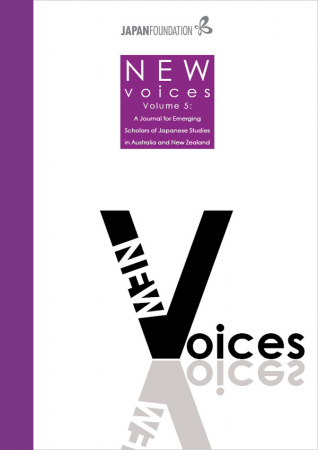2011 has been a good vintage for postgraduate Japanese studies in Australia and New Zealand, as I hope that the arrival of New Voices Volume 5 will amply show. Focusing on subjects such as modern and classical literature, language studies abroad and cross- cultural identity formation, this year’s entries illustrate the depth and width of research within the discipline in our hemisphere. It is interesting to note that the scholarly study of Japan continues to attract excellent young students despite the economic downturn that has characterized the domestic scene in Japan over the past two decades. Japanese studies, in other words, is still going strong in our part of the world. For Japan itself, the threefold catastrophe of March 11 has made an imprint on all aspects of cultural and socio-economical life. It is to be expected that the ongoing situation in Japan will be reflected in forthcoming contributions to New Voices.
For us in academia publications are our lifeline. Even for established scholars it is easy to despair and to feel like an academic version of Willy Loman when we experience a temporary drain in the publication pipeline. This urge to see your own words and thoughts in print is gradually felt from the early stages of postgraduate studies. Postgraduate study can at times be a solitary endeavor that requires lots of perseverance before you get a glimpse of the light at the end of the tunnel. One of the notorious agonies of PhD research is that you may sometimes feel it takes ages before your thoughts meet the printed word and thereby actual readers. Put differently, you feel the need to verify your academic existence continuously, not only at a projected moment years ahead.
In offering a forum for emerging scholars to meet their readers, New Voices eminently fills a void in the lineup of academic journals catering mainly to already established scholars. You may think that the agony described above belongs to the past and does not apply to the Internet age when you are only a mouse click away from expressing yourself to the world in print. In my experience, though, it works the other way around. Exactly because everyone can now communicate freely and ”publish” on the Internet, established platforms for peer-reviewed scholarly articles have actually become increasingly important. At a time when a rapidly increasing amount of ”unauthorized” discourse swirl around in cyber space, carefully scrutinized and edited texts make an important difference. The completion of a PhD degree is sometimes likened to receiving an academic driving license. The degree is a litmus test that guarantees that the holder is qualified to conduct critical inquiry. As the guest editor of New Voices Volume 5, I would hereby like to congratulate the authors presented in this volume for having received their P-plates.
I would also like to take this opportunity to thank the Editorial Advisory Board, the panel of experts who reviewed the articles submitted to the journal and provided invaluable advice for the authors in revising their papers. On behalf of the authors and the Japan Foundation, I would like to extend my gratitude to Dr. Olivier Ansart, Dr. Tomoko Aoyama, Prof. Hugh Clarke, Prof. Nanette Gottlieb, Dr. Christine de Matos, Dr. Jun Ohashi, Dr. Matthew Stavros, Dr. Carolyn Stevens, Dr. Rebecca Suter and Dr. Alison Tokita, for donating their time and expertise in support of New Voices. My thanks also go to Sayuri Tokuman and Susan Yamaguchi at the Japan Foundation, Sydney for coordinating the submissions and publication process for the journal.
Dr Mats Karlsson
The University of Sydney
Editor, New Voices Volume 5

